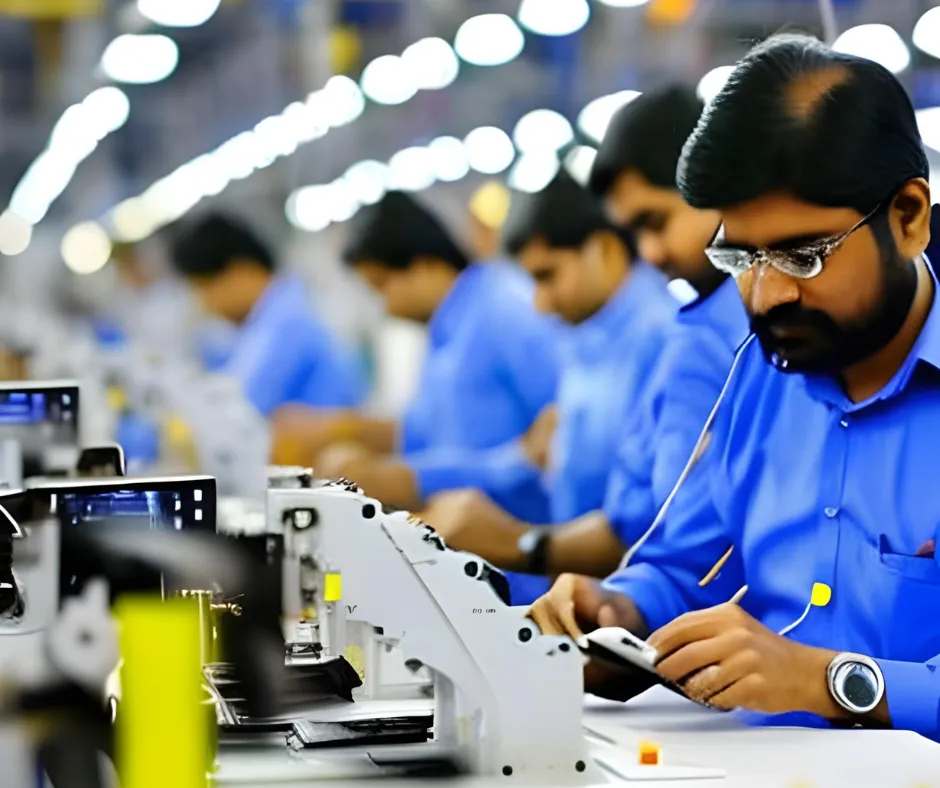Tool and die makers in India | Plastic Mould Manufacturer
15/1 Rama Road
Kirti Nagar Delhi-110015 India
+91 8883912346
asia@hongyijig.com
Certified
ISO 9001:2015
Make in india’s initiative towards fast and better manufacturing with 10x profit

We all know about the news of IPhones 15 and IPhone 15 Plus being produced in India and Its going to provide future profit making opportunities to Indian manufacturers.
The production of the new IPHONE and IPHONE15 is handed over to TATA Group for a smaller batch of IPhones. But the overall production rate of IPhones is 7% which is recorded to grow more in the upcoming future.
Manufacturing and assembling units will be working fast to deliver pre-ordered IPhone in India along with quality control and finish of the final product.
After the Pandemic, a lot of companies have shifted their production line from China to India Because of more freedom in trade and less expensive labor.
The Indian Product Manufacturing Sector has been given this huge opportunity to showcase Big companies all around the world that It can perform better than China and can produce better Quality.
Lets see how Indian Product manufacturing Industry (not just telecommunication industry, But overall Product Manufacturing Industry) is going to be benefited with the MAKE IN INDIA initiative:
- Boost to Manufacturing: “Make in India” promotes the growth of domestic manufacturing industries, encouraging product manufacturers to set up or expand their operations in the country. This increased manufacturing activity contributes to economic growth and job creation.
- Ease of Doing Business: The initiative focuses on improving the ease of doing business in India by streamlining regulatory processes and reducing bureaucratic hurdles. This simplification of procedures makes it easier for manufacturers to start and operate businesses.
- Foreign Direct Investment (FDI): “Make in India” encourages foreign investment in manufacturing by liberalizing FDI norms in various sectors. This attracts foreign companies to establish manufacturing facilities in India, leading to technology transfer and job creation.
- Global Competitiveness: By focusing on improving infrastructure, logistics, and connectivity, “Make in India” enhances the competitiveness of Indian manufacturers in the global market. Improved infrastructure reduces production costs and transit times, making Indian products more competitive internationally.
- Export Promotion: “Make in India” encourages export-oriented manufacturing. This not only boosts foreign exchange earnings but also exposes Indian manufacturers to global markets, promoting competitiveness and innovation.
- Technology Adoption: International companies investing in India often bring advanced technologies and manufacturing processes. This technology transfer benefits local manufacturers and contributes to the modernization of the Indian manufacturing sector.
- Supply Chain Development: As manufacturing activities expand, there is a natural growth in the supporting ecosystem, including suppliers, logistics providers, and service providers. This strengthens the overall supply chain, making it more efficient and reliable.
- Reduction in Import Dependency: As domestic manufacturing grows, India becomes less dependent on imports for finished products. This is particularly important for essential and strategic industries, reducing vulnerability to supply chain disruptions.
- Diversification of Industries: “Make in India” encourages the diversification of industries, reducing reliance on a few sectors. This diversification creates a more resilient and balanced economy.
- Attractive Incentives: Various state and central government incentives and schemes are available to manufacturers under the “Make in India” program. These incentives may include tax benefits, financial support, and access to industrial zones and clusters.
- Entrepreneurship Promotion: The initiative supports entrepreneurship by facilitating the establishment of small and medium-sized enterprises (SMEs). It encourages innovation and helps local entrepreneurs scale up their manufacturing businesses.
- Technology Transfer: Apple’s involvement in India has facilitated the transfer of advanced manufacturing technologies and processes. Local manufacturers have the opportunity to learn from Apple’s expertise in quality control, precision engineering, and production efficiency.
- Increased Investment: The presence of a global technology giant like Apple has attracted further investment from other tech companies. This not only strengthens the Indian manufacturing ecosystem but also encourages innovation and competition.
- Global Export Opportunities: As Indian manufacturers become integrated into Apple’s supply chain, they may have opportunities to export their products to other countries. This international exposure can lead to business expansion and revenue growth.


